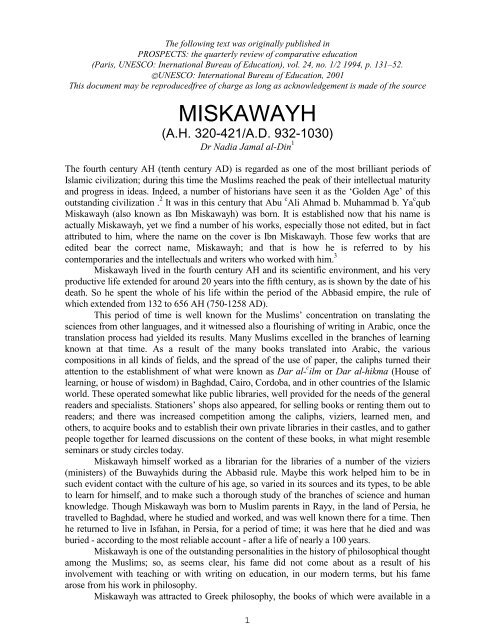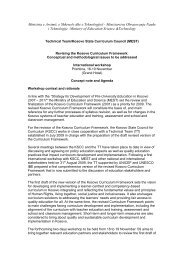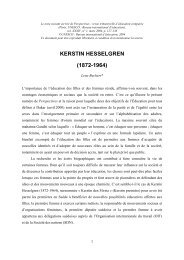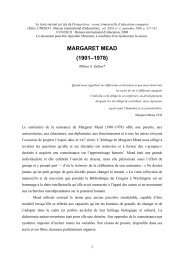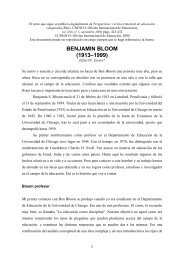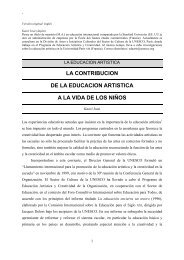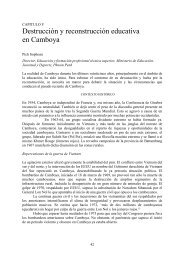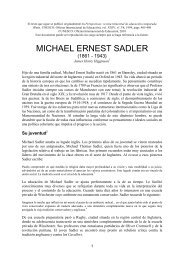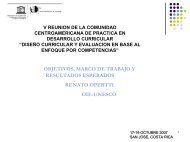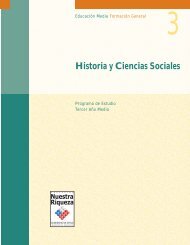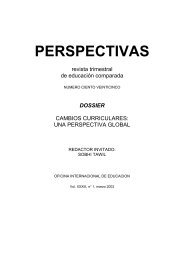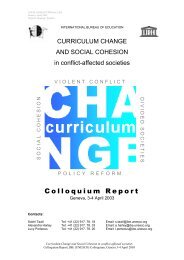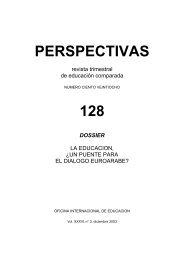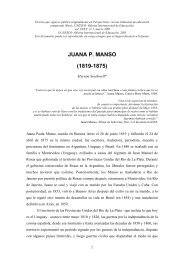MISKAWAYH - International Bureau of Education - Unesco
MISKAWAYH - International Bureau of Education - Unesco
MISKAWAYH - International Bureau of Education - Unesco
Create successful ePaper yourself
Turn your PDF publications into a flip-book with our unique Google optimized e-Paper software.
The following text was originally published in<br />
PROSPECTS: the quarterly review <strong>of</strong> comparative education<br />
(Paris, UNESCO: Inernational <strong>Bureau</strong> <strong>of</strong> <strong>Education</strong>), vol. 24, no. 1/2 1994, p. 131–52.<br />
©UNESCO: <strong>International</strong> <strong>Bureau</strong> <strong>of</strong> <strong>Education</strong>, 2001<br />
This document may be reproducedfree <strong>of</strong> charge as long as acknowledgement is made <strong>of</strong> the source<br />
<strong>MISKAWAYH</strong><br />
(A.H. 320-421/A.D. 932-1030)<br />
Dr Nadia Jamal al-Din 1<br />
The fourth century AH (tenth century AD) is regarded as one <strong>of</strong> the most brilliant periods <strong>of</strong><br />
Islamic civilization; during this time the Muslims reached the peak <strong>of</strong> their intellectual maturity<br />
and progress in ideas. Indeed, a number <strong>of</strong> historians have seen it as the ‘Golden Age’ <strong>of</strong> this<br />
outstanding civilization . 2 It was in this century that Abu c Ali Ahmad b. Muhammad b. Ya c qub<br />
Miskawayh (also known as Ibn Miskawayh) was born. It is established now that his name is<br />
actually Miskawayh, yet we find a number <strong>of</strong> his works, especially those not edited, but in fact<br />
attributed to him, where the name on the cover is Ibn Miskawayh. Those few works that are<br />
edited bear the correct name, Miskawayh; and that is how he is referred to by his<br />
contemporaries and the intellectuals and writers who worked with him. 3<br />
Miskawayh lived in the fourth century AH and its scientific environment, and his very<br />
productive life extended for around 20 years into the fifth century, as is shown by the date <strong>of</strong> his<br />
death. So he spent the whole <strong>of</strong> his life within the period <strong>of</strong> the Abbasid empire, the rule <strong>of</strong><br />
which extended from 132 to 656 AH (750-1258 AD).<br />
This period <strong>of</strong> time is well known for the Muslims’ concentration on translating the<br />
sciences from other languages, and it witnessed also a flourishing <strong>of</strong> writing in Arabic, once the<br />
translation process had yielded its results. Many Muslims excelled in the branches <strong>of</strong> learning<br />
known at that time. As a result <strong>of</strong> the many books translated into Arabic, the various<br />
compositions in all kinds <strong>of</strong> fields, and the spread <strong>of</strong> the use <strong>of</strong> paper, the caliphs turned their<br />
attention to the establishment <strong>of</strong> what were known as Dar al- c ilm or Dar al-hikma (House <strong>of</strong><br />
learning, or house <strong>of</strong> wisdom) in Baghdad, Cairo, Cordoba, and in other countries <strong>of</strong> the Islamic<br />
world. These operated somewhat like public libraries, well provided for the needs <strong>of</strong> the general<br />
readers and specialists. Stationers’ shops also appeared, for selling books or renting them out to<br />
readers; and there was increased competition among the caliphs, viziers, learned men, and<br />
others, to acquire books and to establish their own private libraries in their castles, and to gather<br />
people together for learned discussions on the content <strong>of</strong> these books, in what might resemble<br />
seminars or study circles today.<br />
Miskawayh himself worked as a librarian for the libraries <strong>of</strong> a number <strong>of</strong> the viziers<br />
(ministers) <strong>of</strong> the Buwayhids during the Abbasid rule. Maybe this work helped him to be in<br />
such evident contact with the culture <strong>of</strong> his age, so varied in its sources and its types, to be able<br />
to learn for himself, and to make such a thorough study <strong>of</strong> the branches <strong>of</strong> science and human<br />
knowledge. Though Miskawayh was born to Muslim parents in Rayy, in the land <strong>of</strong> Persia, he<br />
travelled to Baghdad, where he studied and worked, and was well known there for a time. Then<br />
he returned to live in Isfahan, in Persia, for a period <strong>of</strong> time; it was here that he died and was<br />
buried - according to the most reliable account - after a life <strong>of</strong> nearly a 100 years.<br />
Miskawayh is one <strong>of</strong> the outstanding personalities in the history <strong>of</strong> philosophical thought<br />
among the Muslims; so, as seems clear, his fame did not come about as a result <strong>of</strong> his<br />
involvement with teaching or with writing on education, in our modern terms, but his fame<br />
arose from his work in philosophy.<br />
Miskawayh was attracted to Greek philosophy, the books <strong>of</strong> which were available in a<br />
1
variety <strong>of</strong> Arabic translations because there were so many translators. However, he did not stop<br />
short at logic and theology, as did preceding Muslim philosophers such as al-Farabi<br />
(260-339/873-950), considered among Muslims as the Second Teacher after Aristotle, who was<br />
known to them as the First Teacher. Rather, he continued his path to deal with matters left aside<br />
by most <strong>of</strong> his predecessors or contemporaries among the philosophers. He differed from them<br />
in his concern for ethics more than most other studies <strong>of</strong> traditional philosophy at that time.<br />
Hence he was named by some the ‘Third Teacher’, since he was considered the first ethical<br />
thinker among the Muslims. 4<br />
If Miskawayh was famous particularly in the field <strong>of</strong> ethics, yet like others <strong>of</strong> the best<br />
Muslim intellectuals he was very much attracted to the philosophy <strong>of</strong> the famous Greeks such as<br />
Plato and Aristotle and others, whose books, translated into Arabic, exerted their special<br />
fascination on those who worked with philosophy or were devoted to it. 5<br />
Perhaps the influence <strong>of</strong> Plato and Aristotle on Miskawayh is shown most clearly in his<br />
book Tahdhib al-akhlaq wa-tathir al-a c raq (Refinement <strong>of</strong> character and purification <strong>of</strong><br />
dispositions). He did not confine himself to the works <strong>of</strong> the great Greek philosophers, but<br />
studied others and referred to them also in his various works. These included Porphyrius,<br />
Pythagoras, Galen, Alexander <strong>of</strong> Aphrodisias, and Bryson. From this latter he took over most <strong>of</strong><br />
what he wrote in connection with the education <strong>of</strong> young boys, although this man was not well<br />
known, as will be detailed later. 6<br />
In addition, Miskawayh is very clearly distinguished from others who worked in science<br />
and philosophy, within Islamic civilization, by the fact that he indicated clearly and distinctly<br />
the sources on which he drew; something which proves his scientific reliability, and also<br />
emphasizes his patent admiration for the branches <strong>of</strong> learning which he studied, well known and<br />
widespread throughout the Islamic community. So he did not hesitate to rewrite these in his own<br />
language, Arabic.<br />
Just as he was influenced by the Greek philosophers, so he was by his predecessors and<br />
contemporaries among the Muslim philosophers and scholars. Some <strong>of</strong> those he referred to<br />
distinctly in his writings, such as al-Kindi or al-Farabi, while with others he was content to<br />
mention their ideas only.<br />
Maybe one <strong>of</strong> the most important characteristics <strong>of</strong> Miskawayh also, emphasizing his<br />
great admiration for the Greek philosophy which had reached him, is that he did not aim for a<br />
reconciliation between religion and philosophy, as other previous Muslim philosophers had<br />
done. Nor did he attempt to combine them, as was done by the Brethren <strong>of</strong> Purity for example;<br />
but the opinions he set forth remained Greek in nature, and usually attributed to their original<br />
exponents. 7<br />
Miskawayh’s scientific output is not restricted precisely to the field <strong>of</strong> philosophy and<br />
ethics, but he made a distinguished contribution to history; he also busied himself with<br />
chemistry, and was concerned with literature and other subjects. This emphasizes the multiple<br />
facets <strong>of</strong> his culture, making him a mirror for his age; for he is distinguished by the many<br />
sources <strong>of</strong> his culture and the encyclopedic nature <strong>of</strong> his writings. 8<br />
Miskawayh said himself in his book Tahdhib al-akhlaq, for example, that it is a book<br />
composed ‘for the lovers <strong>of</strong> philosophy in particular, and it is not for the general public’. 9<br />
Maybe this simply indicates how much he was influenced by the culture coming to the Islamic<br />
nation, and well known at his time. It may be, too, that it distanced him to some extent from the<br />
Islamic tendency, which did not recognize particularity in the field <strong>of</strong> learning, because the<br />
specialization <strong>of</strong> the élite in rational sciences was merely a Greek idea, as is well known.<br />
Ethics and education<br />
2
The book Tahdhib al-akhlaq is considered the most famous book <strong>of</strong> Miskawayh; so this is the<br />
work <strong>of</strong> which we shall examine the contents quite carefully, so as to base on it our presentation<br />
<strong>of</strong> Miskawayh’s remarks on the education <strong>of</strong> young boys, only. For the work contains, in<br />
general, the majority <strong>of</strong> opinions which he introduced in this subject, although he did aim for a<br />
basis to acquaint the reader with the way to reach the supreme happiness. Maybe this tendency<br />
<strong>of</strong> his can be considered an effective translation, or a practical application, <strong>of</strong> the views he<br />
embraced, such as ‘seeing comes before action’ 10 i.e. knowledge precedes action. For if the<br />
reader knows moral happiness, and is influenced by the contents <strong>of</strong> the book, all his actions will<br />
be fine, according to his interpretation. Hence it can be said that Miskawayh’s book prepares the<br />
way for anyone who examines its contents to reach supreme happiness. So it is not possible to<br />
separate the learner’s personality and character from the science he learns, and the aim and<br />
objective for which he is striving to learn it. 11<br />
The second maqala (section) <strong>of</strong> the seven in the book discusses character, humanity, and<br />
the method <strong>of</strong> training young men and boys. This is preceded in the first maqala by a discussion<br />
<strong>of</strong> the soul and its virtues. This all amounts to a general introduction, which needed to be<br />
presented because <strong>of</strong> the prevailing opinion in Miskawayh’s day, where psychological studies<br />
took precedence over any other philosophical subject. This was like an obligatory introduction<br />
to every philosophical study.<br />
This ‘moral happiness’ was the happiness enabling the human being to live happily, in<br />
accordance with the requirements <strong>of</strong> virtue. Thus it was a personal happiness which the human<br />
being could reach through intellectual effort, and striving to acquire the sciences which would<br />
make his thought inclusive <strong>of</strong> all the areas and all existent beings, and make him free himself<br />
from material things so as to reach the degree <strong>of</strong> wisdom whereby to grasp human perfection.<br />
The knowledgeable one who reaches this degree <strong>of</strong> supreme happiness is, in Miskawayh’s<br />
opinion, called ‘the one completely happy’, and the pleasure he attains, in this case, is an<br />
intellectual pleasure. 12<br />
Miskawayh mentions supreme happiness in the third maqala <strong>of</strong> Tahdhib al-akhlaq, and<br />
gives a detailed account <strong>of</strong> it in order to attract the attention <strong>of</strong> one who does not know it, so that<br />
he will seek it and will be seized by the desire to reach it. 13<br />
After this Miskawayh sets out to clarify the various kinds <strong>of</strong> happiness and its virtues,<br />
which the human being is able to approach, and to live happily in this world following the<br />
requirements <strong>of</strong> virtue, in his view. To realize this, he cites a number <strong>of</strong> conditions, some<br />
internal and some external. Among internal conditions, which influence the rational state <strong>of</strong> the<br />
human being and his moral direction towards good or bad, are conditions within his own body,<br />
in respect <strong>of</strong> his enjoyment <strong>of</strong> health and moderate temperament. Other conditions are external<br />
to the human body, and help him to rise above shortcomings, and to love good for others, to<br />
include friends, children, and wealth. For love <strong>of</strong> others, and affection towards them, can play a<br />
part in the progress and upward movement <strong>of</strong> all people; that is because these are a sphere for<br />
fulfilling the different virtues. In addition, there are conditions in the environment surrounding<br />
the human being, inasmuch as human society is one <strong>of</strong> the basic conditions <strong>of</strong> reaching supreme<br />
happiness. The human being can only fulfil his perfection if it is affirmed that he is a social<br />
being, as well as being rational.<br />
As a result <strong>of</strong> human beings living together with others, and being in contact with them,<br />
their experience is enriched and virtues are rooted in their soul by way <strong>of</strong> putting these virtues<br />
into practice.<br />
The importance <strong>of</strong> transactions with people, as Miskawayh says, refers to the fact that<br />
transactions lead to the appearance <strong>of</strong> virtues which only do so in company and in dealings and<br />
interaction with others, such as integrity, courage, and generosity. If the person did not live in<br />
this human milieu, these virtues would not be apparent, and the human being would become just<br />
like people frozen or dead. Miskawayh repeats in several places that it is for this reason the wise<br />
3
men said that man is civil by nature, meaning that he needs a city, containing many people, for<br />
his human happiness to be complete. This being so, it is easy to refer the idea back to its original<br />
source, since Aristotle presented it in his book the Nicomachean Ethics. 14<br />
Besides all this, the basic conditions for reaching happiness are psychological conditions<br />
and factors; this is because training the soul, cleansing it, teaching it, making it pr<strong>of</strong>it from<br />
general and particular experiences, are centred on the human’s will and his ability to raise his<br />
inclinations, so as to attain the degree <strong>of</strong> happiness appropriate for him. The sixth maqala,<br />
entitled ‘Medicine for souls’, clarifies the importance for man to know his own defects. The<br />
seventh, entitled ‘Restoring health to the soul’, clarifies the method <strong>of</strong> treating the illnesses <strong>of</strong><br />
souls. In this maqala, Miskawayh does not distinguish between evil and illness; and the<br />
psychological evils or illnesses he lists are: rashness, cowardice, pride, boasting, frivolity,<br />
haughtiness, scorn, treachery, accepting injustice, and fear. Miskawayh is concerned with<br />
talking about the fear <strong>of</strong> death, also grief. For he considers that it is not difficult for the rational<br />
man who desires to free his soul from its pains and save it from its dangers to examine the<br />
illnesses and treat them so as to be set free from them. This must be by success from God and by<br />
the man’s own personal striving; both are required, one completing the other. 15<br />
The above may serve to explain that, for Miskawayh, ethics are very closely bound up<br />
with the objective <strong>of</strong> the human being’s education; for he stresses continually that it is not<br />
possible to distinguish between the learner’s personality and character, on the one hand, and on<br />
the other the science he learns and the aim and objective for which he is striving to learn it. This<br />
is what he stresses very clearly in the introduction to his book, stating:<br />
Our aim in this book is that we should acquire for our souls a character, whereby we shall give rise to deeds which<br />
are all fine and good, yet will be easy for us, with no trouble nor hardship. This will be by craft and educational<br />
organization, and the way here is that we should firstly know our own souls, what they are, and what kind <strong>of</strong> thing<br />
they are, and for what reason they were created within us - I mean, their perfection and their aim - and what are their<br />
faculties and abilities, which, if we use them as is needful, will bring us to this high rank; and what are the things<br />
holding us back from it, and what will purify them so they prosper, and what will come upon them so that they fail. 16<br />
Ethics as a philosophical study is considered a practical philosophy, which strives to decide<br />
what should be; so examining this field <strong>of</strong> study does not lead to philosophical reflection as a<br />
final aim, but rather it is used in practical life. Maybe Miskawayh himself emphasizes this in his<br />
looking at philosophy and its divisions, for he sees that it is divided into two parts: a theoretical<br />
part and a practical part, each completing the other. 17<br />
It should be pointed out that when Miskawayh set out to talk <strong>of</strong> the training <strong>of</strong> young<br />
boys, he only approached this subject as his serious intellectual concern with the final end to<br />
which the human being is heading, or should be heading; and his moral philosophy, as a whole,<br />
brings the human being to reach supreme happiness; for there is no paradise nor fire, no reward<br />
nor punishment, since he distinguishes between philosophy and religion. He considers that<br />
religion retains man in his state <strong>of</strong> childhood and boyhood, where the faculty <strong>of</strong> the intellect is<br />
weak, while philosophy and supreme happiness remain for the human being’s youth and<br />
manhood, where his intellect is mature and he knows how to use it towards the highest virtues<br />
and most perfect aims. 18<br />
The foregoing clarifies, to a great extent, how Miskawayh remained one <strong>of</strong> the Muslim<br />
thinkers most devoted to Greek philosophy. For he distinguishes between reason and faith, or<br />
between philosophy and religion, since the supreme happiness is a human happiness, one which<br />
is neither imposed on man nor withheld from him by anything outside the scope <strong>of</strong> his will, and<br />
issuing from an intellect greater and stronger than his. 19<br />
Within this framework Miskawayh’s discussion <strong>of</strong> the training <strong>of</strong> young men and boys<br />
is placed, and within this framework also his viewpoint must be understood and read, in what<br />
concerns the choice <strong>of</strong> this age-group rather than another to talk about, and to present some<br />
4
opinions and viewpoints on the matter <strong>of</strong> their training.<br />
The training <strong>of</strong> young men and boys<br />
In his writings Miskawayh did not use the word ‘education’ (tarbiya) since it was not a word<br />
widely used in his day and his milieu with the technical meaning it has today. It may also be<br />
well known that the word ‘education’ was only quite recently used in modern European<br />
languages with the meaning now intended. The tendency here has been to use the very same<br />
word which Miskawayh used in his writings, ‘training’ (ta’dib) so as not to impose on it more<br />
than was actually said, and in order to present his thoughts in connection with this important<br />
human process without encroaching on his rights. 20 The opinion here is that reading the text in<br />
accordance with the language <strong>of</strong> his age, and the meanings it carries which the writer himself<br />
intended to express, is more precise and closer to scientific integrity.<br />
It is also useful to point out that the word ‘teaching’ (ta c lim) was the word in widest<br />
circulation and most used in Islamic civilization to express what we mean today by the word<br />
‘education’ in many <strong>of</strong> its aspects. So the words ‘teaching’ and ‘learning’ (ta c allum) are also<br />
very close to words like ‘training’ and ‘culture’ (adab), where they express the meaning<br />
intended. Their use was widespread also in the third and fourth centuries AH, likewise the word<br />
‘education’; now some consider that the Qur’an’s use <strong>of</strong> them restricts them to what we today<br />
call the period <strong>of</strong> early childhood. This can be attested by reference to the Qur’anic words, for<br />
instance: ‘Say, Lord, have mercy on them, as they nurtured (rabba) me when young.’ (17:24).<br />
This being so, education indicates a task, <strong>of</strong> an obligatory nature, which is undertaken by adults,<br />
particularly parents, for the young. 21 If so, it can be said that the meaning <strong>of</strong> training primarily<br />
indicates the effort expended and directed by adults, to impart to the young desirable<br />
knowledge, morality, customs, and behaviour, to prepare them in the manner which makes them<br />
the acceptable human model within their society, i.e. the Muslim community <strong>of</strong> that time.<br />
Miskawayh aimed to discuss ‘refinement <strong>of</strong> character’ and realizing this; he reflected,<br />
and based this on what was said by Aristotle in his book <strong>of</strong> Ethics, and in the book <strong>of</strong><br />
Discourses also, that evil may be transmitted through training, even to the best; but not in all<br />
circumstances. For he sees that repeated warnings, and training, and people’s adopting good<br />
virtuous policies, must have some sort <strong>of</strong> influence among the kinds <strong>of</strong> people; there are some<br />
who accept training and move swiftly towards virtue, and others who approach it, and move<br />
towards virtue slowly. 22<br />
Miskawayh ends his discussion <strong>of</strong> this opinion by explaining his view that every person<br />
can be changed; having done this, he indicates its influence on young men and boys, and the<br />
necessity to train them. Miskawayh does not confine himself to this view <strong>of</strong> Aristotle, but<br />
deduces it also from the reliable laws that are the way God deals with His creation. 23<br />
So Miskawayh held that what the boy has been accustomed to since youth will be <strong>of</strong><br />
influence when he grows up; hence, he discussed the training <strong>of</strong> young boys, to which subject he<br />
devoted some pages <strong>of</strong> his book. This was one part <strong>of</strong> his thinking to realize his aim;<br />
consequently he made use <strong>of</strong> one <strong>of</strong> the books available and well known in his academic<br />
environment, and indicated it with exceptional confidence. Maybe this was a result <strong>of</strong> his<br />
trusting that what he did not write about his original aim, despite its importance, the Greek<br />
author, well known in his day, achieved the very same objective. So he borrowed from him, and<br />
thus in the second maqala <strong>of</strong> Tahdhib al-akhlaq there is the following heading: ‘Section on<br />
training young men and boys, the ideas taken from the book <strong>of</strong> Brusun’.<br />
Certain Orientalists came across some copies <strong>of</strong> this book, including a copy in the<br />
Egyptian National Library (Dar al-kutub al-misriyya), with the title ‘the book <strong>of</strong> Brisis on a<br />
man’s management <strong>of</strong> his household (domestic economy)’ (Kitab Brisis fi tadbir al-rajul li-<br />
5
manzilihi). However, the name was also written on an inside page <strong>of</strong> the book, as ‘Brusun’:<br />
which the German Orientalist Paul Kraus corrected to Bryson. 24<br />
Whatever the opinion, this book, or manuscript, turned his attention to treating the<br />
method <strong>of</strong> domestic economy, through the discussion <strong>of</strong> four points:<br />
1. money<br />
2. servants<br />
3. women<br />
4. children.<br />
Miskawayh took from this Greek author only what he said about children, which<br />
emphasizes what was already indicated, and it could almost be a literal transmission in many<br />
places; however, he sometimes added certain personal experiments and observations resulting<br />
from his own life experience. 25 So it is useful to extract from this discussion some detail on:<br />
The aims <strong>of</strong> training young boys, according to Miskawayh<br />
Maybe reflection on the title <strong>of</strong> his book, ‘Refinement <strong>of</strong> character’, will produce a swift result,<br />
the import being that he trusted in the possibility <strong>of</strong> refining and purifying morals from the evils<br />
and wickedness attached to them. To this end we see him determining ‘that the art <strong>of</strong> character<br />
forming which is concerned with the betterment <strong>of</strong> the actions <strong>of</strong> the human being as human,<br />
this is the most excellent <strong>of</strong> the arts’. 26<br />
This trust is emphasized by the fact that in many places in his book he considers that his<br />
remarks about young boys are equally suitable for adults. 27 It is not easy for the adult to change<br />
his character, with which he has grown up and been nurtured, except according to special<br />
conditions; unless indeed he himself grasps the extent to which his morals are corrupt, and<br />
forms the purpose <strong>of</strong> changing them.<br />
This sort <strong>of</strong> man it is hoped will abstain from his (evil) morals gradually and have<br />
recourse to the exemplary way by repentance and by keeping company with the good and the<br />
wise by the pursuit <strong>of</strong> philosophy. 28<br />
The reason behind his emphasis on the possibility <strong>of</strong> refining character and purifying<br />
souls, and freeing the self from evil habits and the like, stems from his opinion about people,<br />
which is that they are either good by nature or good by reason <strong>of</strong> the law and learning. 29 Despite<br />
this, people differ in receptivity to training as regards eagerness for it, and their share <strong>of</strong> virtuous<br />
morality and fine dispositions. 30 Thence, they are not all in one single rank as regards<br />
acceptance <strong>of</strong> virtuous morality; and if they differ, then this difference and disparity between<br />
them, which is beyond reckoning, merits the greatest concern with training and habituation <strong>of</strong><br />
young men to approved actions. For neglect <strong>of</strong> training will cause every human being to remain<br />
in the condition he was in during childhood. Put in another way, Miskawayh considers that<br />
humanity is in constant need <strong>of</strong> adapting what he was brought up to and became accustomed to<br />
in childhood, and also what suits him naturally. If he does not do this, he falls into the place <strong>of</strong><br />
the wretched, and his link with God is severed. This wretchedness is confirmed if he continues<br />
in four characteristics:<br />
1. laziness, idleness, and wasting his life without work, with no human benefit;<br />
2. stupidity and ignorance, caused by failure to investigate and exercise the soul with the<br />
teachings spoken by wise men;<br />
3. insolence, which results from neglect <strong>of</strong> the soul when it pursues desires and is<br />
unrestrained and seeks to commit sins and evil deeds;<br />
4. the preoccupation which arises from persistence in ugly deeds. 31<br />
For each one <strong>of</strong> these kinds <strong>of</strong> wretchedness or illnesses there is a treatment, with which the<br />
intelligent man can heal himself, if he tries to set himself free. So the manners spoken <strong>of</strong> by<br />
6
Miskawayh to train young men and boys can bring about benefits which revert to the person so<br />
trained.<br />
From another angle, training (or education) can be regarded as realizing specified aims,<br />
equally whether this be from the viewpoint <strong>of</strong> the one who assumes responsibility for it, or <strong>of</strong><br />
the one subjected to it. To clarify this, we can present Miskawayh’s own explanations, to extract<br />
from them the aims that can be directed to this business <strong>of</strong> training. Miskawayh says:<br />
These good manners, which are useful to boys, are likewise useful to older people; but they are more useful to the<br />
young, because they habituate them to the love <strong>of</strong> virtues and so they grow up accordingly. Then it is not hard for<br />
them to avoid evils, and later it is easy for them to follow all the prescriptions <strong>of</strong> wisdom and the regulations <strong>of</strong> the<br />
Law (shari c a) and Tradition (sunna). They become accustomed to keep themselves from the temptations <strong>of</strong> wicked<br />
pleasures; they restrain them from indulging in any <strong>of</strong> those pleasures or thinking too much about them. They make<br />
them desire the high rank <strong>of</strong> philosophy and promote them to the high matters described at the beginning <strong>of</strong> this<br />
work, such as seeking proximity to God the Most High, and being near to the angels. They will also be favoured in<br />
this world, with a pleasant life, and a fine reputation. Their enemies will be few, many will praise them and seek<br />
their friendship, especially the virtuous. 32<br />
From this text, which is repeated in various forms in the Tahdhib, we can deduce more than one<br />
aim for refining and training in Miskawayh’s view. Indeed, it can be said that these aims include<br />
some which are temporal, for this earthly life, and some which are concerned with the time after<br />
death, with the eternal abode. Each is interconnected.<br />
That which is connected with training and avoidance <strong>of</strong> evils, and exercise <strong>of</strong> the soul,<br />
and following what the Law and Tradition define, and what wisdom prescribes: all this together<br />
leads to a goodly condition in this world, and a pleasant life, and a fine reputation; this is<br />
clarified in what actually happens, by way <strong>of</strong> having few enemies and many who praise him and<br />
seek his friendship and company. Thus, the practical aim attached to this earthly life, and<br />
resulting from the refinement <strong>of</strong> character, is bringing about the human being’s adaptation to<br />
those around him: and this is exemplified in his conduct and his relationships with them. If he<br />
conforms with this, continues in it, and his knowledge becomes true and his action correct,<br />
‘sufficiency lies not in the knowledge <strong>of</strong> virtues, but in acting with them’, as Miskawayh<br />
continually determines. 33 When the human being really acts in accordance with his knowledge,<br />
this demonstrates that he has reached the rank <strong>of</strong> the wise, or what can be expressed as the<br />
highest point <strong>of</strong> perfection in humanity. 34 The human being’s personal effort in seeking<br />
knowledge, and in his work and his conduct, leads him to be: ‘the happy, the perfect, seeking to<br />
come close to God the Most High, the loving, the obedient, and worthy <strong>of</strong> his friendship and<br />
love’. 35<br />
Since in Miskawayh’s opinion, and as he says, also in Aristotle’s, God is ‘the Wise, the<br />
Happy, the Perfect in wisdom; He is loved only by the happy and the wise, for a being is only<br />
happy with its like’. Hence, whoever approaches God and so earnestly seeks His favour, ‘God<br />
loves him and brings him close to Him, and he will be worthy <strong>of</strong> His friendship’. 36 Whoever<br />
approaches God, and God brings him close, becomes in this way supremely happy, with a<br />
happiness that cannot be surpassed. 37<br />
This is the final aim <strong>of</strong> man’s journey through life, the conclusion <strong>of</strong> his work and his<br />
service here; and his striving to purify his character, as Miskawayh prescribed, and presented to<br />
others who desired his knowledge, in the hope <strong>of</strong> being helped to realize it.<br />
By this definition <strong>of</strong> the final aim, there must perforce be the means enabling it to be<br />
reached; and consequently leading questions can be put, concerning the method <strong>of</strong> the<br />
upbringing <strong>of</strong> human beings in the way which helps them to fulfil this aim; and following on<br />
what Miskawayh said, the reply to this requires concern for the training and refining <strong>of</strong> souls;<br />
thence it is possible to begin by acquaintance with the souls <strong>of</strong> the young men and boys, and the<br />
factors influencing them, or what we could call in today’s language ‘Human nature and the<br />
7
factors influencing its formation’.<br />
Humanity in general, Miskawayh considers, is the noblest <strong>of</strong> all existing beings on the<br />
earth which we inhabit. 38 The soul <strong>of</strong> the boy is ready to receive virtue, because it is ‘simple, not<br />
yet impressed with any form, nor has it any opinion nor determination turning it from one thing<br />
to another’. 39 Also because the soul <strong>of</strong> the boy is ready to accept training; so there must be<br />
concern for the boy, and he must be cared for, and not left to one who cannot do this training<br />
well or who does not have fine characteristics and excellent habits. Miskawayh remarks that<br />
these opinions are taken from Aristotle, but he very soon turns in another direction to present the<br />
boy’s soul and its faculties in a picture that agrees with what Plato had earlier said in the<br />
Republic. This is that the soul, as has been said, is divided into three faculties, the appetitive, the<br />
irascible, and the rational. These faculties appear gradually, as the boy grows, until he reaches<br />
his perfection and is then called rational. And diffidence is the sign <strong>of</strong> this intelligence, and the<br />
indication that the boy has reached the stage <strong>of</strong> discernment, and consequently training, since<br />
diffidence means his fear <strong>of</strong> doing anything unseemly. 40<br />
Also Miskawayh presents the means or the way by which it is possible to recognize or<br />
deduce when the boy has reached this state: which is, that by careful scrutiny <strong>of</strong> the boy his<br />
intelligence can be deduced. This is that when the inquirer looks at him and finds he has<br />
lowered eyes, does not stare, and his face is not insolent, this is among the signs <strong>of</strong> his nobility<br />
and his fear <strong>of</strong> doing anything unseemly, and his preference for the good, and attaining reason.<br />
So his soul is ready for training, fit to be taken care <strong>of</strong>, and must not be neglected. Miskawayh’s<br />
experience in this field, with his Greek culture, is his guide and the source <strong>of</strong> his ideas.<br />
The social environment in which the boy grows up plays an evident role in the formation<br />
<strong>of</strong> the boy’s soul, or what can be called the business <strong>of</strong> bringing him up. That is because the<br />
boy’s soul is simple, and as yet without imprint, and is ready and receptive to training, fit to be<br />
taken care <strong>of</strong>; when it finds itself in a bad social milieu, this leads to its being influenced by<br />
those around, and consequently its corruption: the soul accepts what it grows up with and is<br />
accustomed to, and hence comes the concern to watch over young men and boys in particular. 41<br />
The basic responsibility for this falls upon the parents. 42<br />
The aim in watching over the family here, and training the parents, is to reform the soul<br />
<strong>of</strong> the boy; for when he mixes with his peers and plays with those <strong>of</strong> his own age-group, he is<br />
influenced by them. In his early life, as Miskawayh remarks, he will be bad in his actions,<br />
relating what he has neither heard nor seen, passing on false tales. He may even stretch out his<br />
hand to other people’s possessions, or may transmit stories which he hears, and may be overinquisitive.<br />
Because <strong>of</strong> all this, there must be a concern for training and refinement as long as he<br />
is a child, for children usually take more swiftly to learning and training. Their characters appear<br />
in them from the very earliest stage, and they cannot hide them nor dissimulate as an adult can<br />
who has developed to the point where he knows his own defects and so conceals them by<br />
carrying out actions which in fact are contrary to his nature. This being so, it is easy to recognize<br />
evil character among young men and boys and to work to set them free from it, and habituate<br />
them to virtuous morals since it is possible for them to receive these swiftly. 43<br />
Methods <strong>of</strong> training the young boy<br />
Beginning with these views, Miskawayh presents the methods that are followed in training and<br />
refining the boy’s soul. Some <strong>of</strong> these seem abstract, seeking to influence the boy’s soul, and<br />
some are connected with his conduct and his external appearance. These can all be detailed as<br />
follows:<br />
8
METHODS OF TRAINING THE BOY’S SOUL<br />
For him the psychological aspect is the most important, so he began with mentioning a number<br />
<strong>of</strong> abstract methods; to start with, Miskawayh gives a number <strong>of</strong> positive aspects, i.e. attraction,<br />
and these ways include:<br />
• Praise is considered one <strong>of</strong> the most important <strong>of</strong> these means and methods suggested;<br />
that is, praising the boy for the good things he does which are acceptable to the adults;<br />
and also adults who do good deeds should be praised in his presence. All this emphasizes<br />
fine actions, whether performed by him or by adults, and by those considered to be an<br />
example for him.<br />
• Encouragement to rise above the desire for food and drink and fine clothing.<br />
Encouragement here is by commending abstinence from these things and contentment<br />
with only the small amount necessary.<br />
• He should be trained to admire generous characteristics, such as preferring others over<br />
himself in matters <strong>of</strong> food and drink, and he should confine himself to what is moderate<br />
and seek it.<br />
• He should be warned <strong>of</strong> punishment, and made to fear blame for any evil deed he may<br />
demonstrate.<br />
If intimidation is employed, this must be by degrees, for if the boy transgresses in any matter<br />
which has been mentioned to him, and made attractive to him, or he ceases to do this, then it is<br />
best, in this case, to pretend not to have noticed, especially if he himself realizes the error and<br />
tries to conceal it and hide it from others.<br />
If it is necessary to reproach the boy for what he has done, so that he will not revert to it,<br />
then this should be done in secret; because disclosing these matters might lead the boy to be<br />
impudent, and he would think little <strong>of</strong> hearing blame, and consequently indulging in detestable<br />
pleasures to which his nature incites him. These pleasures are numerous. 44<br />
After all these psychological methods, the educator can have recourse to physical<br />
punishment if the preceding methods are not successful, and if it is really needed. 45<br />
MANNERS LINKED TO THE BOY’S CONDUCT<br />
These rules <strong>of</strong> conduct are connected either with sensory pleasures such as food and drink, or<br />
with the external appearance such as clothes, or finding relaxation from the weariness <strong>of</strong> study.<br />
However, these also have their rules such as play and physical exercise, and other rules linked to<br />
his conduct and his relationships with others; these are now given in detail.<br />
Rules <strong>of</strong> food and drink<br />
In this case, the boy must understand the basic aim <strong>of</strong> taking food, that it is a necessity and is<br />
desired for the health <strong>of</strong> the body, not as a means <strong>of</strong> sensory pleasure; hence he looks on it as<br />
medicinal for the body, to remedy the pains <strong>of</strong> hunger and guard against illness.<br />
Since food is not desired for its own sake, nor for its sensory enjoyment, or that should<br />
be the case, Miskawayh presents a collection <strong>of</strong> advice which can be said to be more appropriate<br />
for the ascetic Sufi novice than for a boy in his prime, and at a fundamental stage in his growth.<br />
In Miskawayh’s view, the educator is meant to make the boy despise the idea <strong>of</strong> food, and<br />
should reduce its amount and its variety; so he should restrict himself to one kind when he is<br />
eating, and should sometimes eat dry bread on its own. Miskawayh considers that if these<br />
manners are commendable for the poor, it is even better to have the rich seek them. Meat should<br />
be infrequent, and going without it most <strong>of</strong> the time is better, together with abstention from<br />
9
sweets and fruit.<br />
The main meal is best taken at supper, so that it will not lead him to sleep during the<br />
day, for this is not approved.<br />
Food has its manners which must be watched over, and here Miskawayh advises the boy<br />
not to hurry over it, and to chew it very well; not to let his glance dwell for long on the food and<br />
the people eating, and where they put their hands, and not to stain his hands or clothing.<br />
The boy must not drink during the meal, and must beware <strong>of</strong> wine and any kinds <strong>of</strong><br />
intoxicating drinks, for these are harmful to both body and soul. Furthermore, the boy must<br />
avoid attending any drinking sessions, so that he will not hear the follies which go the rounds at<br />
such times, unless they are attended by well-bred, virtuous people, from whose conversation and<br />
knowledge he can pr<strong>of</strong>it. Here, it is noticeable that Miskawayh did not say that wine is<br />
something forbidden, as is clearly laid down in the Islamic religion; thence, in his view, the<br />
prohibition is not from the rulings <strong>of</strong> the Islamic religion as they are the exemplary view <strong>of</strong> how<br />
the virtuous man should be, and the morals to which the boy must be trained and habituated.<br />
There are rules <strong>of</strong> etiquette connected with the boy’s external appearance also:<br />
Rules <strong>of</strong> etiquette for clothing<br />
Miskawayh explains that the boy must grow up in the way right and fitting for people <strong>of</strong> nobility<br />
and honour; so he should wear white clothing, and avoid coloured or patterned clothing, since<br />
that is more proper for women and slaves. This has to be repeated in the boy’s ears many times,<br />
so that he may be brought up, or grow up, in this way. Also the boy is asked not to adorn<br />
himself with what women would wear, nor to wear a seal-ring except when this is needed, nor<br />
to wear his hair long. This counsel extends to not taking pride in his father’s possessions,<br />
whether food or clothing or anything else. Love <strong>of</strong> gold and silver is a disaster, and the boy must<br />
be advised to avoid them and not to use them in any shape or form. 46<br />
It is a duty to care for the body, since it brings its benefits to the boy, and here there are<br />
rules <strong>of</strong> etiquette which he should learn and follow; so Miskawayh is concerned with physical<br />
exercise. Despite the importance <strong>of</strong> this exercise for the body, Miskawayh did not neglect also<br />
the psychological effect <strong>of</strong> play, and hence he puts forward some features that must be present.<br />
Rules for physical exercise and play<br />
Miskawayh advises giving the boy the opportunity to play at certain times, although this play<br />
must be <strong>of</strong> a good kind, to let him relax from the weariness <strong>of</strong> learning and observing etiquette;<br />
however, there should be nothing in this play to cause the boy pain or distress. 47<br />
If play here is necessary for relaxing from the exertion <strong>of</strong> training, physical exercise is<br />
important to the body, since the boy must be accustomed to walk, to move, and to ride, so that<br />
he does not become lazy; this because the various kinds <strong>of</strong> exercise dispel dullness and awaken<br />
energy and purify the soul. 48<br />
In connection with this, too, Miskawayh warns against sleeping for too long; for this<br />
makes him lazy, dulls his mind, and deadens his thought; and he determines the boy must be<br />
prevented from sleeping at all during the day. 49<br />
Miskawayh then presents a group <strong>of</strong> the various manners with which the boy must be<br />
provided. These as a whole prescribe the features distinguishing what may be called the refined<br />
man or the virtuous man, those features that society in general accepts and which can be defined<br />
as follows:<br />
General rules <strong>of</strong> conduct<br />
10
Miskawayh sets forth a number <strong>of</strong> rules <strong>of</strong> etiquette (adab) connected with the external<br />
appearance and the general image <strong>of</strong> the virtuous human being in his society, to all <strong>of</strong> which the<br />
boy must be brought up and accustomed. He must not spit when in company, nor blow his nose,<br />
nor yawn in the presence <strong>of</strong> others; he must not cross his legs, nor put his hand beneath his<br />
beard, or support his head between his hands, because to do these things is a sign <strong>of</strong> laziness.<br />
Concerning the ethical aspect, Miskawayh mentions another collection <strong>of</strong> rules <strong>of</strong><br />
etiquette which the boy must grow up with, as a kind <strong>of</strong> personal virtues, which are related to<br />
his dealings with others: for example, never to swear, whether truthfully or falsely, for that is<br />
disgraceful for men, though it may sometimes be necessary. In addition to not swearing, the boy<br />
must be accustomed to talk only a little, and only in reply to questions. He must become used to<br />
listening to those older than himself, and keeping silence before them; he must be prevented<br />
from saying anything evil, from uttering insults, curses, or foolish talk; he should be encouraged<br />
to fine and elegant speech, to greet others in a graceful fashion. 50<br />
The boy must also become used to obeying his parents, teachers, and trainers: he should<br />
regard them with respect and honour, and fear them. If the teacher chastises him, the boy must<br />
learn not to show pain, so he must not cry out nor ask anyone to intercede for him; for such is<br />
the conduct <strong>of</strong> servants or slaves without fortitude.<br />
It is vital also that the boy be accustomed to serve himself and his teacher and all who<br />
are older than him; however, it is in particular those boys who are the sons <strong>of</strong> the wealthy and<br />
affluent who most need to be brought up and habituated to this conduct.<br />
Despite all that has been indicated, the person who cares for the boy and undertakes his<br />
training has the duty to give him the opportunity for rest, and also must be kind to the boys and<br />
reward them for good conduct with something better.<br />
Miskawayh transmits all this as it is sometimes, but sometimes changes it somewhat and<br />
expands what he takes over, in a style much finer than that <strong>of</strong> the Arabic translation in the<br />
manuscript kept in the Egyptian National Library. 51<br />
It is most likely that Miskawayh did not continue to copy from the Greek philosopher<br />
Bryson, but rather that he added material <strong>of</strong> his own which he considered completed what he<br />
borrowed; and these opinions were influenced either by his personal experience or by his<br />
Islamic environment.<br />
Some <strong>of</strong> the opinions he sets forth confirm his awareness <strong>of</strong> the importance <strong>of</strong> the early<br />
stages <strong>of</strong> human maturing, or the early stages <strong>of</strong> growth, for on these are built many<br />
characteristics in the person’s future life, as is well known nowadays. If this is the case, it<br />
confirms the importance <strong>of</strong> the first years in the boy’s upbringing, and the influence <strong>of</strong> the<br />
environment on his character in particular; and in the light <strong>of</strong> his personal experience, he makes<br />
deductions regarding what went before. This is clear in his reference to the virtuous kings <strong>of</strong><br />
Persia, who used not to educate their sons among their retinue, their servants, and their<br />
companions, for fear that they should be influenced by them. For this reason, the Persian kings<br />
used to send their sons in the company <strong>of</strong> trustworthy men to distant regions where their<br />
education was undertaken by tough people living a harsh life, who did not know luxury or ease.<br />
These kings <strong>of</strong> Persia were imitated by many <strong>of</strong> the powerful leaders in the Abbasid caliphate at<br />
that time, who would remove their sons to distant places, so they could grow up in their<br />
character far from the people and customs in wicked countries. 52<br />
Being at some distance from his teachers the Greeks, he quite soon differed from them;<br />
inasmuch as he states that the first <strong>of</strong> all teachings is the Shari c a, which must be inculcated into<br />
the human being while young. That is because the foundation on which character is built later is<br />
the Shari c a, and as Miskawayh affirms, it is: ‘that which reforms the young and accustoms them<br />
to good deeds, and prepares their souls to accept wisdom and seek virtues and reach human<br />
happiness, with sound thought and correct reasoning’. 53 This being so, the responsibility for<br />
11
children’s upbringing and directing them in accordance with the law’s requirements falls on the<br />
shoulders <strong>of</strong> the parents. 54<br />
The purport <strong>of</strong> this is that the first years <strong>of</strong> education, or years <strong>of</strong> upbringing as<br />
Miskawayh calls them, are the basic years; so this demands concern for them, and therefore he<br />
confirms:<br />
Whoever in his youth happens to be brought up by the rules <strong>of</strong> the Shari c a and is made to observe its duties and<br />
provisions until he is habituated, then studies books <strong>of</strong> ethics until these manners and good qualities are confirmed in<br />
his soul by pro<strong>of</strong>; then he studies arithmetic and geometry, so he becomes accustomed to true speech and correct<br />
demonstration. 55<br />
Here Miskawayh makes religion a foundation for training and refinement; and after the supports<br />
<strong>of</strong> faith are established in the boy’s soul, he can study books on ethics, then arithmetic and<br />
geometry, or whatever can be deduced or proved by rational pro<strong>of</strong>s. If it can be said that in this<br />
there is much influence <strong>of</strong> the Islamic environment in which he lived, and the culture in which<br />
he was brought up, which influenced his intellectual orientation, yet as is made clear in the texts<br />
we have quoted, he does not specify any particular Law or definite religion. 56 All the same,<br />
when we take over his words, concluding that he is talking about the Islamic Law or the Islamic<br />
religion, since he lived within the Islamic community, despite this being a sound conclusion, it<br />
remains the reader’s viewpoint as to what Miskawayh wrote, and is not precisely what he said.<br />
Whatever the opinion, knowledge <strong>of</strong> the Law is only an introduction or a preparatory<br />
stage for souls, so that they can later accept wisdom, for with continued growth the soul can<br />
reach the stage <strong>of</strong> longing for the sciences and knowledge, and seeking virtues, and reaching<br />
human happiness. 57 By becoming habituated to virtues and persevering in them, it becomes easy<br />
for the boy to reach ‘the high rank <strong>of</strong> philosophy’. 58<br />
Observations and critique<br />
The preceeding may give a picture <strong>of</strong> the basic features <strong>of</strong> Miskawayh’s educational ideas that<br />
he put forward in one <strong>of</strong> the most important <strong>of</strong> all his books; it contains also a selection <strong>of</strong> his<br />
words from The Book <strong>of</strong> Happiness (Kitab al-sa c ada). His words <strong>of</strong> ‘advice to the seeker <strong>of</strong><br />
wisdom’ or philosophy which were included in Yaqut’s biographical dictionary <strong>of</strong> literary men<br />
(Mu c jam al-udaba’) drew a picture <strong>of</strong> the philosopher <strong>of</strong> ethics as he imagined him. This is<br />
almost explained and repeated in his words in the Tahdhib. 59 Perhaps it is also possible, from<br />
the books referred to and the previous swift overview <strong>of</strong> his opinions, to set out a clear picture<br />
<strong>of</strong> the Greek influence on the thinking <strong>of</strong> a Muslim philosopher who drew on the culture <strong>of</strong> the<br />
age he lived in and took from it what was best. He had the greatest admiration for, and<br />
confidence in, the famous Greek philosophers, those who still hold their place in human<br />
thought. This confirms the clarity <strong>of</strong> his vision and his ability to choose from among the kinds<br />
<strong>of</strong> culture reaching the Islamic community; indeed, it also confirms the ability <strong>of</strong> Islamic<br />
civilization to take up the sciences coming to it from previous civilizations, to make use <strong>of</strong><br />
them, to work with them, and add to them.<br />
Maybe this is emphasized by Miskawayh’s indication that he borrowed what he found<br />
suitable in the works <strong>of</strong> the Greek ‘Brusun’, as he referred to him. Of all the Muslim<br />
philosophers and thinkers whose intellectual works have come down to us, he is the only one to<br />
have said this.<br />
Something which emphasizes and clarifies our view here is the fact that there are some<br />
who think that certain well-known Muslim philosophers, apart from Miskawayh, borrowed<br />
from this book <strong>of</strong> Greek origin, though they did not mention their source - such as Ibn Sina<br />
(370-428/980-1037) and al-Ghazali (450-505/1059-1111). 60<br />
12
Further clarification can be found in the work <strong>of</strong> an Orientalist M. Plessner, who in the<br />
1920s published an ‘Arabic’ translation <strong>of</strong> a Greek text entitled Kitab Brusun fi tadbir al-rajul<br />
li-manzilihi (Book <strong>of</strong> Brusun on domestic economy) (Heidelberg 1928). He observed that ‘the<br />
Book <strong>of</strong> Policy attributed to Ibn Sina is no more than a summary <strong>of</strong> the book <strong>of</strong> Bryson’. 61<br />
When comparing the Book <strong>of</strong> Policy (Kitab al-Siyasa) published by Louis Cheikho, in a<br />
collection <strong>of</strong> ancient philosophical articles <strong>of</strong> some famous Arabic philosophers (maqalat<br />
falsafiyya qadima li-ba c d mashahir falasafat al- c arab) (Beirut 1911), he found that the content<br />
is concerned with the theme<br />
that the human being is a civil animal needing to live in society for the sake <strong>of</strong> fulfilling his basic needs. He divides<br />
up man’s policy for his needs or management <strong>of</strong> his affair into five sections: a man’s conduct <strong>of</strong> himself, his<br />
directing his income and expenditure, his ruling his family (wife), his guidance for his children, his governing <strong>of</strong> his<br />
servants. What comes under these headings is in the Epistle <strong>of</strong> Policy, a precise summary <strong>of</strong> what is in Bryson’s<br />
book already mentioned. 62<br />
This is what has been said by some, to explain Ibn Sina’s borrowing from Bryson. Abu Hamid<br />
al-Ghazali may have done just the same, although he does not indicate that he borrowed from<br />
anyone. However, a reading <strong>of</strong> the section in The Revival <strong>of</strong> the Religious Sciences (Ihya’ c ulum<br />
al-din) on training boys, entitled ‘Explanation <strong>of</strong> the way in the exercise <strong>of</strong> boys when they are<br />
first growing, and how to train them and improve their character’ 63 shows clearly the points <strong>of</strong><br />
resemblance between what was said by both Ghazali and Miskawayh, borrowing from another<br />
source; which has led some to say that al-Ghazali copied from Miskawayh without indicating<br />
the fact. 64 Despite this, and as it is now known that Miskawayh borrowed from and clearly<br />
defined his Greek source, then it may perhaps be said that the source <strong>of</strong> both was the same,<br />
except that it is the Greek heritage translated into Arabic in a variety <strong>of</strong> versions. In this case<br />
perhaps al-Ghazali was one who copied directly from the text <strong>of</strong> Bryson, well known before his<br />
time and perhaps also during it, and did not borrow from Miskawayh; or perhaps he read the<br />
Greek original, and also read Miskawayh, and took from them both; for not much real difference<br />
exists between the translation and the composition.<br />
Despite all this, the fact remains that both were influenced by an Arabic translation<br />
known as ‘the Book <strong>of</strong> Brusun (or Brisis) on domestic economy’; that each <strong>of</strong> them still kept his<br />
distinctive viewpoint and his aim in training young men and boys in particular, and the aspects<br />
<strong>of</strong> his philosophy as a whole. Maybe it can be said also that although al-Ghazali was influenced<br />
by this, yet his expression <strong>of</strong> the final aim <strong>of</strong> training young boys remained closer to the spirit <strong>of</strong><br />
the Islamic religion than Miskawayh; that is because for al-Ghazali the actual content <strong>of</strong><br />
education, or its material, was taken from the Qur’an and the Prophet’s sunna. 65<br />
Perhaps it also needs to be pointed out that Miskawayh was content simply to talk about<br />
the training <strong>of</strong> boys, without giving any details concerning the content <strong>of</strong> this training or the<br />
educational material which should be learnt by the boy; likewise he did not refer to the teachers,<br />
nor their manners and culture, as did others whose aims were in fact to write about the<br />
educational process and things connected with it. 66<br />
If Miskawayh wove together his thinking from both religious and philosophical sources,<br />
or he did not hesitate to take over what the minds <strong>of</strong> wise men had concluded in the moral realm<br />
and met with the objectives <strong>of</strong> the Islamic shari c a - yet his being influenced by the new cultures<br />
was not entirely good. For what is particularly noticeable in everything Miskawayh said<br />
previously is that he spoke only about training young boys, to the exclusion <strong>of</strong> girls, and he did<br />
not direct any obvious care towards them nor to women in general. In this he was influenced by<br />
the source from which he drew, or the portion <strong>of</strong> the book that he uses, and did not add to it. In<br />
this case, it would seem Miskawayh was writing for an imaginary, non-existent society, one in<br />
which women had no place, and thence he restricted his discussion to boys, the men <strong>of</strong><br />
13
tomorrow, and no more. Maybe it has been said also that he did acknowledge the existence <strong>of</strong><br />
women in his society, yet the evil opinions widespread about them, and influenced by the new<br />
cultures, caused him not to give any concern to them. For the philosophers, or those who were<br />
influenced by the new philosophies, opposed the spirit <strong>of</strong> Islam and what was decreed by the<br />
Tradition (hadith) and sunna <strong>of</strong> the Prophet, in this point in particular, where they confined<br />
themselves to men in expressing their educational opinions, and kept women well outside their<br />
concerns in the sphere <strong>of</strong> teaching. 67<br />
If Miskawayh did distance himself from natural life on this point, yet the rules <strong>of</strong><br />
conduct which he presents and the exercise desirable for training young boys did not show<br />
concern for this boy’s existence in everyday life, and did not prepare him for customary<br />
practical human life, to the extent that it prepared him for a life closer to that <strong>of</strong> the military,<br />
harsh, tough, and ascetic. In addition to this, what he would acquire as a result <strong>of</strong> this endeavour<br />
would be much clearer when the soul freed itself from the body; for the reward is for later, when<br />
this life is finished, when the spirit will obtain closeness to the Perfectly Happy, as has already<br />
been mentioned.<br />
Although Miskawayh indicated society in a city, and its necessity for the human being,<br />
he did not refer to the various kinds <strong>of</strong> work with its necessity and importance for the<br />
permanence <strong>of</strong> this city and also for the human beings living in it. That is, he did not speak<br />
about preparing the boy for work, and his various roles as producer and consumer, one with a<br />
pr<strong>of</strong>ession or craft or labour by which to provide for his future. By reference to his words about<br />
the necessity <strong>of</strong> linking learning with action, the action meant here seems to be human conduct<br />
in general, and not productive work from the economic angle as we understand it today. This<br />
also places him nearer the thought <strong>of</strong> the new culture, regarding its elevation <strong>of</strong> intellectual<br />
activity and leaving work to the lower orders in society, to servants and slaves. So he did not<br />
consider preparation for earthly life, from the angle <strong>of</strong> work and acquiring a livelihood, to be<br />
among the aims <strong>of</strong> the upbringing and training <strong>of</strong> young boys. Maybe this could be interpreted<br />
as saying he did acknowledge that his book was for the few, and not for the general public;<br />
therefore that he was presenting an education to prepare a learned, thinking élite, striving to<br />
purify the soul, with sufficient time and maybe also ampleness <strong>of</strong> life-style which permitted<br />
them that, for then the aim <strong>of</strong> training was all concentrated on benefit for the individual in the<br />
first place and not for the whole community.<br />
Although the responsibility <strong>of</strong> refining and purifying the soul is an individual one, where<br />
every human being is responsible for himself in the first place, and then to complete the virtues<br />
he can help others in following along the way - yet Miskawayh did not speak <strong>of</strong> acts <strong>of</strong> worship<br />
obligatory for mankind in Islam, for these are responsibilities which fall on the shoulders <strong>of</strong> the<br />
adult person. Nor did Miskawayh mention any one <strong>of</strong> the foundations <strong>of</strong> culture in the Islamic<br />
community, except for religion and the learning and sciences and so on, which are closely<br />
connected with it. Maybe he considered this among the matters which are completed at an early<br />
stage, which the individual can reach and practise without much assistance; or that they have<br />
their foundations to which the boy can be directed; then what he presents in his book is only<br />
concerned with particular matters known only to the privileged. This may be borne out by the<br />
fact that Miskawayh’s talking about training young boys was only one part <strong>of</strong> his ethical<br />
thinking, and was not one <strong>of</strong> his precisely intended aims. 68<br />
To sum up the foregoing, the basic aim <strong>of</strong> training and exercise and acquisition <strong>of</strong><br />
knowledge, and working by it, is the refinement and purification <strong>of</strong> the soul: thence fulfilling its<br />
perfection in this world, then reaching its happiness, realized by proximity to the Perfectly<br />
Happy.<br />
So the basic, and final, aim <strong>of</strong> training is an ethical aim, although it speaks <strong>of</strong> closeness<br />
to God by way <strong>of</strong> seeking to resemble Him in the hope <strong>of</strong> proximity to Him, and acquiring<br />
absolute happiness by this proximity. This idea is taken mainly from Aristotle, following what<br />
14
Miskawayh says about happiness by closeness to the Perfectly Happy, and is not satisfaction <strong>of</strong><br />
God and attaining the reward in His paradise which God the Most High promised to His<br />
servants who follow His commands and avoid what He prohibits. It is confirmed that ‘the<br />
Happy’ is not one <strong>of</strong> the attributes <strong>of</strong> God the Most High in the Islamic view; so bringing the<br />
human soul to realize supreme happiness by closeness to the Perfectly Happy after being set free<br />
from the body, in its picture which Miskawayh presents, expresses only an ethical philosophical<br />
aim, rather than a religious aim. Hence, although Miskawayh lived in an Islamic cultural<br />
environment, he directed his intellect to Greek thought, and his aims for upbringing and training<br />
and refinement, or education in today’s language, were an expression <strong>of</strong> the culture which he<br />
had borrowed from, not the culture in which he lived. Nevertheless, the basic credit here goes to<br />
the spirit predominant in the Islamic community, which could permit at least some <strong>of</strong> its<br />
thinkers to transmit, or be influenced by, cultures <strong>of</strong> other nations previous to itself, without<br />
impediment; and it confirms also the idea <strong>of</strong> the meeting <strong>of</strong> cultures and the cross-fertilization<br />
<strong>of</strong> world civilizations and their mutual influence, in an ongoing movement <strong>of</strong> human thought.<br />
The human being will always remain capable <strong>of</strong> producing knowledge, seeking to increase it,<br />
transmitting it to others, adding to it, renewing it; which means it merits continual care and<br />
attention, to teach it, and, following Miskawayh’s example, to refine character and purify the<br />
dispositions.<br />
15
Notes and references<br />
1. Nadia Gamal-al-Din (Egypt) Pr<strong>of</strong>essor in the principles <strong>of</strong> education, College <strong>of</strong> <strong>Education</strong>, ‘Ayn Shams<br />
University, Cairo. In 1987, she was awarded the State Prize for the Advancement <strong>of</strong> the Socail Sciences<br />
(<strong>Education</strong>). Her books on education among the Muslims include Falsafat al-tarbiya ‘Inda Ikhwan al-<br />
Safa’ [Philosophy <strong>of</strong> <strong>Education</strong> in (the works <strong>of</strong>) the Brethren <strong>of</strong> Purity] (1983); Madaris al-tarbiya fi lhadara<br />
al-islamiyya [Schools <strong>of</strong> <strong>Education</strong> in Islamic Civilization] (co-author, 1984). She has also<br />
published papers in a number <strong>of</strong> adult education periodicals, with particular reference to illiteracy among<br />
village women. The most recent <strong>of</strong> these papers was published in Women and Literacy Development in the<br />
Third World, edited by Eve Malmquist (1992).<br />
2. See for instance: Adam Metz, al-hadara al-islamiyya fi l-qarn al-rabi c al-hijri (Islamic civilization in the<br />
fourth century AH) trans. Muhammad c Abd al-Hadi Abu Rayda, Cairo, Lijnat al-ta’lif wa-l-tarjama wa-lnashr,<br />
1957.<br />
3. See for instance Abu Hayyan al-Tawhidi, al-Imta c wa-l-mu’anasa (delight and sociability), Beirut,<br />
Maktabat al-Hayat, n.d.; T.J. De Boer, Ta’rikh al-falsafa fi l-Islam (History <strong>of</strong> philosophy in Islam) trans.<br />
Muhammad c Abd al-Hadi Abu Rayda, Cairo, Lijnat ..., 1938.<br />
c c c<br />
4. Abd al- Aziz Izzat, Ibn Miskawayh, falsafatuhu al-akhlaqiyya wa-masadiruha (Ibn Miskawayh: his<br />
ethical philosophy and its sources), Cairo, Maktaba wa-Matba c at Mustafa al-Babi al-Halabi, 1946, 8. For<br />
more detail on the life <strong>of</strong> Miskawayh, see pp. 77-123.<br />
5. For more detail on books translated from Greek in particular, and their translaters, see e.g. Ibn al-Nadim<br />
(Abu l-Faraj Muhammad b. Abi Ya c qub Ishaq, known as al-Warraq), Kitab al-Fihrist, ed. Rida Tajaddud,<br />
Tehran 1971.<br />
6. For more detail, additional to the above, see: al-Qifti (Jamal al-Din Abu l-Mahasin c Ali b. al-Qadi al-<br />
Ashraf Yusuf), Ikhbar al- c ulama’ bi-akhbar al-hukama’ (on wise men and philosophers), Beirut, Dar al-<br />
Athar li-l-taba c a wa-l-nashr wa-l-tawzi c , n.d.<br />
7.<br />
c Abd al- c Aziz c Izzat, Ibn Miskawayh, 349 ff.<br />
8. See more detail at the end (<strong>of</strong> this article), the section on Ibn Miskawayh’s scientific works. For more<br />
detail on the special effect <strong>of</strong> the writings <strong>of</strong> this period on Islamic civilization, in addition to Adam Metz,<br />
see: Ahmad Amin, Zuhr al-Islam (Islam’s noon-day), Cairo, Maktabat al-Nahda al-Misriyya, 1966 (4<br />
parts).<br />
9. Abu c Ali ahmad b. Muhammad, known as Ibn Miskawayh, Tahdhib al-akhlaq, Cairo, Maktabat<br />
Muhammad c Ali Subayh, 1959, 76. The opinion we think reliable is that he is Miskawayh, not ‘Ibn<br />
Miskawayh’; but this work is not edited, and the name on the cover is ‘Ibn Miskawayh’. So we need to<br />
point this out here, as it is given thus on the cover, in accordance with usual academic practice.<br />
10. (Ibn) Miskawayh, ibid., 76.<br />
11. ibid., 30.<br />
12. ibid., 7.<br />
13. ibid., 137.<br />
14.<br />
c<br />
Izzat, Ibn Miskawayh, 387.<br />
15. (Ibn) Miskawayh, 226-235.<br />
16. ibid., 3.<br />
17. ibid., 40-41.<br />
18. ibid., 42, 60, 203.<br />
19.<br />
c Izzat, 383.<br />
20. For more detail on the various meanings and uses <strong>of</strong> this word, see: Nadia Jamal al-Din, in: Hassan<br />
Muhammad Hassan and Nadia Jamal al-Din, Madaris al-tarbiya fi l-hadara al-islamiyya (Schools <strong>of</strong><br />
education in Islamic civilization), Cairo, Dar al-Fikr al- c Arabi, 1984, 194-8.<br />
21. For more detail on this point in particular see: c Abd al-Fath Jalal, Min usul al-tarbiya fi l-Islam (<strong>of</strong> the<br />
sources <strong>of</strong> education in Islam), Sars al-liyan (Sierra Leone) Matba c at al-markaz al-duwali li-l-ta c lim alwazifi<br />
li-l-kibar fi l- c alam al- c arabi, 1977, 17 ff.<br />
22. (Ibn) Miskawayh, 35.<br />
23. ibid.<br />
24. For more detail, and for information on what Miskawayh took from the Greek philosopher Aristotle, and<br />
his books translated into Arabic, see: c Izzat, Ibn Miskawayh, 366 ff. On the comparison with what<br />
Miskawayh mentioned, taken from the book <strong>of</strong> ‘Brusun’, as he referred to his name, translated into Arabic,<br />
see ibid., 425 ff. This point will be treated in detail later.<br />
25. For more detail see ibid.<br />
26. (Ibn) Miskawayh, 36.<br />
16
27. ibid., 31.<br />
28. ibid., 66-67.<br />
29. ibid., 76.<br />
30. ibid., 34-35.<br />
31. ibid., 126.<br />
32. ibid., 64-65.<br />
33. ibid., 176.<br />
34. ibid., 67.<br />
35. ibid., 177.<br />
36. ibid., 174.<br />
37. ibid., 75, 105, 125, 175.<br />
38. ibid., 37.<br />
39. ibid., 57; see also 77.<br />
40. ibid., 58-59.<br />
41. ibid., 66.<br />
42. ibid., 35.<br />
43. ibid.,<br />
44. ibid., 60.<br />
45. ibid., 35.<br />
46. ibid., 61-64.<br />
47. ibid., 64.<br />
48. ibid., 65.<br />
49. ibid., 62.<br />
50. ibid., 64.<br />
51.<br />
c<br />
Izzat, 43.<br />
52. (Ibn) Miskawayh, 66.<br />
53. ibid., 35.<br />
54. ibid., 104.<br />
55. ibid., 51.<br />
56. ibid., 35.<br />
57. ibid., 35-36.<br />
58. ibid., 65.<br />
59.<br />
c<br />
Izzat, 137.<br />
60. Hisham Nashaba, al-Turath al-tarbawi al-islami fi khams makhtutat (The Islamic educational heritage in<br />
five manuscripts), Beirut, Dar al- c ilm li-l-malayin, 1988, 8.<br />
61. ibid., 9. See also, c Izzat, 367, 425, 430.<br />
There is one copy <strong>of</strong> the manuscript <strong>of</strong> ‘Brusun’, in Dar al-kutub al-Misriyya (the Egyptian National<br />
Library), Taymur Pasha No. 290, Ethics, entitled ‘The book <strong>of</strong> Brusis on domestic economy’; also under<br />
the title, ‘from the words <strong>of</strong> the sage Brusun on domestic economy’; published by the Orientalist Paul<br />
Kraus, authenticating this, in the Journal <strong>of</strong> the College <strong>of</strong> Arts, Fu’ad I University (now Cairo University),<br />
Egypt, V(1), May 1937. c Abd al- c Aziz c Izzat gave many details in his book, q.v.<br />
62. Imam al-Ghazali, Ihya’ c ulum al-din (Revival <strong>of</strong> the Religious Sciences), foreword by Badawi Tabana,<br />
Egypt, Dar Ihya’ al-kutub al- c arabiyya, n.d., iii. 69-72.<br />
63. Zaki Mubarak, al-Akhlaq c inda al-Ghazali (Ghazali’s Ethics), Cairo, Dar al-kitab al- c arabi li-l-tiba c a wa-lnashr,<br />
1968, 224 ff.<br />
64. For more detail, see: Muhammad Nabil Nawfal, Abu Hamid al-Ghazali wa-ara’uhu fi l-tarbiya wa-l-ta c lim<br />
(Abu Hamid al-Ghazali and his views on education), unpublished MA thesis, Cairo, Maktabat Kulliyat altarbiya.<br />
c Ayn Shams University, 1967, 339.<br />
65. See, e.g., Ben Sahnun, Adab al-mu c allimin (Manners <strong>of</strong> teachers), and al-Qabisi (Abu l-Hasan c Ali b.<br />
Khalaf), al-Risala al-mufassila li-ahwal al-muta c allimin wa-l-mu c allimin (Detailed epistle on the conditions<br />
<strong>of</strong> learners and teachers), both published in: Ahmad Fu’ad al-Ahwani, al-Tarbiya fi l-Islam (<strong>Education</strong> in<br />
Islam), Dar al-ma c arif al-misriyya, 1961.<br />
66. See, e.g., Nadia Jamal al-Din, Falsafat al-tarbiya c inda Ikhwan al-Safa’ (Philosophy <strong>of</strong> education in (the<br />
views <strong>of</strong>) the Brethren <strong>of</strong> Purity), Cairo, al-Markaz al- c arabi li-l-sahafa, 1983.<br />
67. For more details on the sources <strong>of</strong> this objective see c Izzat, 368.<br />
17
Some <strong>of</strong> the writings <strong>of</strong> Miskawayh, printed and in ms.<br />
Miskawayh did not devote any one <strong>of</strong> his books to discussing education, except that his writings contained this<br />
subject; and <strong>of</strong> the most important <strong>of</strong> Miskawayh’s writings, printed several times:<br />
Ahmad b. Muhammad Ya c qub (Miskawayh), Tahdhib al-akhlaq wa-tathir al-a c raq (refinement <strong>of</strong> character and<br />
purification <strong>of</strong> dispositions), Cairo, Maktabat Muhammad c Ali Subayh, 1959.<br />
There are numerous printings <strong>of</strong> the book including the one edited by Qustantin Zurayq, Beirut, Maktabat al-hayat,<br />
1966.<br />
Miskawayh (Abu c Ali Ahmad b. Muhammad) Tajarib al-umam, ed. H.F. Amedroz, Egypt, Matba c at sharikat altamaddun<br />
al-sina c iyya, 1915.<br />
(Ibn) Miskawayh, al-Fauz al-asghar, Egypt, published at expense <strong>of</strong> Mustafa al-kutubi, 1325 AH.<br />
Abu Hayyan al-Tawhidi and Miskawayh, al-Hawamil wa-l-shawamil published by Ahmad Amin in partnership,<br />
Cairo Matba c at Lijnat al-ta’lif wa-l-tarjama wa-l-nashr, 1951.<br />
Dr c Abd al- c Aziz c Izzat’s MA thesis has been published as a book: Ibn Miskawayh wa-falsafatuhu al-akhlaqiyya wamasadiruha<br />
(Ibn Miskawayh, his ethical philosophy and its sources), Cairo, Maktabat wa-matba c at al-Babi al-<br />
Halabi, 1946, 125-141.<br />
The pages referred to contain Miskawayh’s surviving works, printed and lists <strong>of</strong> manuscripts, still<br />
preserved in libraries around the world. His manuscripts include items written on the margins <strong>of</strong> other manuscripts<br />
and which are not independent works.<br />
Miskawayh’s advice to the seeker <strong>of</strong> wisdom, for example, we find published in the book <strong>of</strong> Yaqut al-<br />
Hamawi, the Dictionary <strong>of</strong> Learned Men (Mu c jam al-udaba’) (more usually ma c rifat al-udaba’: trans.) ed.<br />
Margoliouth, ii. 49 ff.<br />
For more details on Miskawayh’s works see also:<br />
Ahmad al-Amin al-Husayni al- c Amili, A c yan al-Shi c a (Notable Shi’ites), i. Damascus 1938.<br />
Khayr al-Din al-Zarkali, al-A c lam (Luminaries), i. Egypt 1927, al-Qifti (Jamal al-Din Abu l-Mahasin c Ali b. al-Qadi<br />
al-Ashraf Yusuf), Ikhbar al- c ulama’ bi-akhbar al-hukama’ (Ta’rikh al-hukama’ - trans.) (Dictionary <strong>of</strong><br />
wise men) Beirut, Dar al-Athar li-l-tiba c a wa-l-nashr wa-l-tawzi c , n.d.<br />
Ibn al-Nadim (Abu l-Faraj Muhammad b. Ya c qub Ishaq, known as al-Warraq), Kitab al-Fihrist (Fihrist: Index), ed.<br />
Rida Tajaddud, Tehran, 1971.<br />
Of the books <strong>of</strong> Miskawayh still extant:<br />
Kitab Taharat al-nafs (purification <strong>of</strong> the soul), in micr<strong>of</strong>ilm (?) in the Egyptian National Library, No. 417<br />
Philosophy.<br />
Javidhan Khirad (Persian) (Eternal wisdom) micr<strong>of</strong>ilm in Library <strong>of</strong> Cairo University, on the margin <strong>of</strong> manuscript<br />
<strong>of</strong> Nuzhat al-arwah wa-raudat al-afrah <strong>of</strong> Shahrazuri, No. 23005.<br />
For more material about Miskawayh<br />
Sa c id al-Diwaji ‘Ibn Miskawayh’ in the book Min a c lam al-tarbiya al- c arabiyya al-islamiyya (some luminaries <strong>of</strong><br />
Arabic Islamic education), ii. Maktab al-tarbiya al- c arabi li-duwal al-khalij, Riyadh, 1988, 221, 242.<br />
Nadia Jamal al-Din, Ma c a kitab tahdhib al-akhlaq wa-tathir al-a c raq (with Tahdhib ...), published in the book <strong>of</strong><br />
Hassan Muhammad Hassan (jointly), Madaris al-tarbiya fi l-hadara al-Islamiyya (Schools <strong>of</strong> education in<br />
Islamic civilization), Cairo, Dar al-fikr al- c arabi, 1984, 268, 301.<br />
See also the article on Miskawayh in Arabic translation in:<br />
Da’irat al-ma c arif al-islamiyya, Vol. 1, Cairo, Dar al-sha c b, n.d. 388, 389.<br />
See also: Encyclopedia <strong>of</strong> Religion and Ethics.<br />
Brockelmann, Geschichte der arabischen Literatur, Supplement, Leiden, 1937.<br />
18


